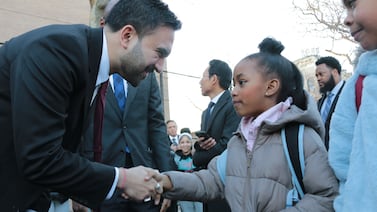Sign up for Chalkbeat Chicago’s free daily newsletter to keep up with the latest news on Chicago Public Schools.
Five years after COVID-19 shuttered schools and disrupted learning, Illinois students’ math scores have yet to rebound from the pandemic fallout. Now, state officials are seeking educators’ input on how to rethink the way math is taught.
The Illinois State Board of Education is kicking off a statewide listening tour in October to get feedback from school leaders, educators, counselors, and others on the first draft of a “Comprehensive Numeracy Plan,” which will provide educators with evidence-based methods to help students succeed in learning math.
The first session is scheduled for Oct. 16 at 4 p.m. at the state board’s Springfield office. The plan has yet to be made public, but a spokesperson for the state said it will be available by the first listening session.
“Numeracy equips students to think critically, solve problems, and make informed decisions in daily life,” said State Superintendent Tony Sanders in a press release. “The Comprehensive Numeracy Plan will give educators the evidence-based tools they need to help students succeed, and it will ensure that every child in Illinois has access to high-quality math instruction.”
Students in third to eighth grades who took the Illinois Assessment of Readiness in spring of 2024 saw an improvement in their math scores from the previous school year, but scores were lower than they were in 2019, signaling that students had yet to rebound from the pandemic, according to the state’s 2024 report card. However, students’ reading scores increased from the previous year and were higher than before the pandemic.
State education officials attributed improvements in reading to the state’s Comprehensive Literacy Plan, which provides recommendations to educators on how to provide evidence-based reading instruction to students. Now, they are hoping a numeracy plan modeled after the literacy blueprint will help improve student outcomes in math.
The final draft of the numeracy plan will be presented to the state board for approval by June 2026, according to the press release.
All listening sessions for the state board’s numeracy plan start at 4 p.m. and those interested can sign up online. Here is a list of dates and location for each session:
- Oct. 16: Springfield - ISBE Office, 100 N. 1st St.
- Oct. 22: Naperville - Northern Illinois University Naperville Campus, NIU Conference Center, 1120 E. Diehl Rd.
- Oct. 23: Rockford - Rockford Public Schools 205 Administration Building, 501 7th St.
- Nov. 4: Virtual
- Nov. 5: Champaign - Urbana University of Illinois Urbana-Champaign, 601 S. Lincoln Ave.
- Nov. 12: Edwardsville - Southern Illinois University Edwardsville, Morris University Center, 60 Hairpin Dr.
- Nov. 13: Carbondale - Carbondale High School, 1301 E. Walnut St.
- Nov. 18: Chicago - Illinois State Board of Education’s Chicago Office, 555 W. Monroe St.
Samantha Smylie is the state education reporter for Chalkbeat Chicago covering school districts across the state, legislation, special education and the state board of education. Contact Samantha at ssmylie@chalkbeat.org.





